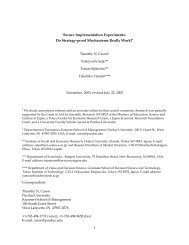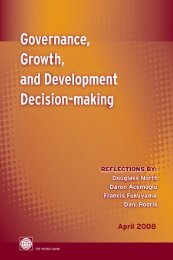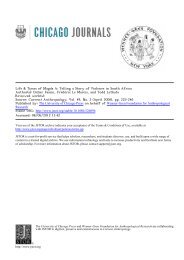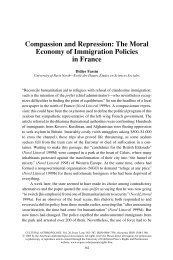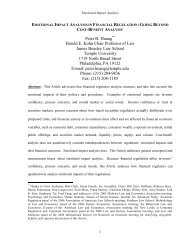The Tools of the Master Slavery and Empire in Nineteenth Century ...
The Tools of the Master Slavery and Empire in Nineteenth Century ...
The Tools of the Master Slavery and Empire in Nineteenth Century ...
Create successful ePaper yourself
Turn your PDF publications into a flip-book with our unique Google optimized e-Paper software.
THE TOOLS OF THE MASTER 9<br />
that time. <strong>The</strong>y allowed that <strong>in</strong> <strong>the</strong> crush<strong>in</strong>g <strong>of</strong> <strong>the</strong> trade <strong>in</strong> slaves, “Your Highness would<br />
thus become <strong>the</strong> pioneer <strong>of</strong> liberty, <strong>and</strong> Egypt be<strong>in</strong>g a l<strong>and</strong> <strong>of</strong> freedom would take rank<br />
among <strong>the</strong> most civilized nations <strong>of</strong> <strong>the</strong> world.” 24<br />
<strong>The</strong> members <strong>of</strong> <strong>the</strong> Society were also well aware that <strong>the</strong>y had public op<strong>in</strong>ion on <strong>the</strong>ir<br />
side. <strong>The</strong> pressure <strong>the</strong>y exerted, which <strong>of</strong>ten had <strong>the</strong> support <strong>of</strong> members <strong>of</strong> Parliament,<br />
resulted <strong>in</strong> <strong>the</strong> Anglo-Egyptian Convention <strong>of</strong> 1877, which abolished <strong>the</strong> trade <strong>in</strong> African<br />
slaves on all territory held by <strong>the</strong> Egyptian government, although it did not outlaw <strong>the</strong> <strong>in</strong>stitution<br />
<strong>of</strong> slavery itself. <strong>The</strong> Anti-<strong>Slavery</strong> Convention was posted by decree throughout<br />
Egypt’s cities <strong>and</strong> <strong>the</strong> Sudan, <strong>and</strong> allowed for <strong>the</strong> creation <strong>of</strong> slave trade bureaus <strong>in</strong> Cairo,<br />
Alex<strong>and</strong>ria, <strong>the</strong> Delta <strong>and</strong> Upper Egypt. <strong>The</strong>se bureaus were <strong>in</strong>tended to not only record<br />
<strong>the</strong> manumission <strong>of</strong> <strong>in</strong>dividual slaves but also to f<strong>in</strong>d suitable employment for freed slaves<br />
<strong>and</strong> possible education for <strong>the</strong>ir children. <strong>The</strong> authorities <strong>of</strong> <strong>the</strong>se bureaus were also responsible<br />
for <strong>the</strong> punishment <strong>of</strong> “any person depriv<strong>in</strong>g a freed slave <strong>of</strong> his freedom or tak<strong>in</strong>g from<br />
him his manumission certificate”; such a person was to be h<strong>and</strong>led as a slave dealer. 25<br />
<strong>The</strong> Anti-<strong>Slavery</strong> Convention may have provided a clear date from which <strong>the</strong> trade <strong>in</strong><br />
slaves was no longer permissible, but it left open wide-rang<strong>in</strong>g <strong>and</strong> important questions<br />
about <strong>the</strong> nature <strong>of</strong> <strong>the</strong> trade <strong>in</strong> Egypt. It also created a stark divide. On one side stood <strong>the</strong><br />
British <strong>of</strong>ficials <strong>of</strong> <strong>the</strong> occupation who were quickly com<strong>in</strong>g to believe <strong>in</strong> a pro-slavery<br />
solidarity among <strong>the</strong> Muslims <strong>of</strong> Egypt such that, <strong>in</strong> <strong>the</strong>ir op<strong>in</strong>ion, <strong>the</strong> provision <strong>of</strong> aid to any<br />
<strong>of</strong> <strong>the</strong> <strong>of</strong>ficials <strong>of</strong> <strong>the</strong> slave trade bureaux would be considered tantamount to treason by<br />
o<strong>the</strong>r Egyptians. On <strong>the</strong> o<strong>the</strong>r side stood <strong>the</strong> majority <strong>of</strong> Egyptians, who saw slaves as<br />
closely connected to <strong>the</strong>ir households, <strong>of</strong>ten as part <strong>of</strong> <strong>the</strong>ir families, <strong>and</strong> who <strong>of</strong>ten believed<br />
that <strong>the</strong> more gentle domestic bondage <strong>of</strong> Egypt was <strong>of</strong> actual benefit to <strong>the</strong> slaves <strong>the</strong>mselves.<br />
<strong>The</strong>re were Egyptians deeply ambivalent about slavery who none<strong>the</strong>less considered<br />
<strong>the</strong> <strong>of</strong>ficials <strong>of</strong> <strong>the</strong> slave trade bureaus to be trespassers, broach<strong>in</strong>g <strong>the</strong> privacy <strong>of</strong> <strong>the</strong><br />
Egyptian family <strong>and</strong> reveal<strong>in</strong>g its secrets to <strong>the</strong> outside world. 26<br />
This sense <strong>of</strong> an <strong>in</strong>vaded privacy put nationalists who called for <strong>the</strong> re-conquest <strong>of</strong> <strong>the</strong><br />
Sudan on <strong>the</strong> defensive, for <strong>the</strong> British authorities <strong>in</strong> Egypt <strong>and</strong> participants <strong>in</strong> <strong>the</strong> antislavery<br />
movement <strong>in</strong> Engl<strong>and</strong> heard with suspicion <strong>the</strong> nationalists’ rhetoric that l<strong>in</strong>ked <strong>the</strong><br />
Sudan corporeally to Egypt <strong>and</strong> <strong>in</strong>terpreted such calls as a defense <strong>of</strong> slavery. Indeed <strong>the</strong><br />
issue <strong>of</strong> slavery <strong>and</strong> its <strong>in</strong>tr<strong>in</strong>sic connectedness to <strong>the</strong> Sudan raised difficult questions for <strong>the</strong><br />
nationalists about <strong>the</strong>ir own society <strong>and</strong> <strong>the</strong>ir own sense <strong>of</strong> communal unity. <strong>The</strong> expression<br />
<strong>of</strong> <strong>the</strong> corporeal connection between Egypt <strong>and</strong> <strong>the</strong> Sudan also reflected <strong>the</strong>n current<br />
debates <strong>and</strong> anxieties about more <strong>in</strong>timate customs like marriage, <strong>and</strong> social notions about<br />
gender <strong>and</strong> race. With so much <strong>of</strong> <strong>the</strong> political <strong>and</strong> physical geography <strong>in</strong> question, literary<br />
constructions <strong>of</strong> <strong>the</strong> Sudan were <strong>of</strong>ten all that kept <strong>in</strong>tact Egyptians’ sense <strong>of</strong> <strong>the</strong> borders <strong>of</strong><br />
<strong>the</strong>ir own l<strong>and</strong>, <strong>and</strong> culture.<br />
One Man’s Slave is Ano<strong>the</strong>r Man’s Wife<br />
<strong>The</strong> nature <strong>of</strong> <strong>the</strong> slavery lived by black men <strong>and</strong> women <strong>in</strong> Egypt <strong>in</strong> <strong>the</strong> n<strong>in</strong>eteenth century<br />
is rarely if ever discussed without be<strong>in</strong>g compared to <strong>the</strong> sear<strong>in</strong>g experiences <strong>of</strong> African<br />
slaves <strong>in</strong> <strong>the</strong> United States <strong>and</strong> <strong>in</strong> <strong>the</strong> Caribbean. From all accounts, it is clear that African<br />
slaves <strong>in</strong> Egypt did not suffer <strong>the</strong> brutality that so characterized <strong>the</strong> treatment <strong>of</strong> blacks <strong>in</strong><br />
<strong>the</strong> American South. <strong>The</strong>re was no similar plantation culture, no ritualized public violence<br />
to punish rebellious slaves. Few could argue, however, that <strong>the</strong> <strong>in</strong>itiation <strong>in</strong>to slavery, <strong>the</strong><br />
raids <strong>of</strong> <strong>the</strong> traders, <strong>the</strong> abrupt <strong>and</strong> traumatic dismember<strong>in</strong>g <strong>of</strong> families had a terrible effect<br />
on <strong>the</strong> slaves. Nor could it be denied that <strong>the</strong> trek along <strong>the</strong> Forty Days’ Road was <strong>of</strong>ten a



